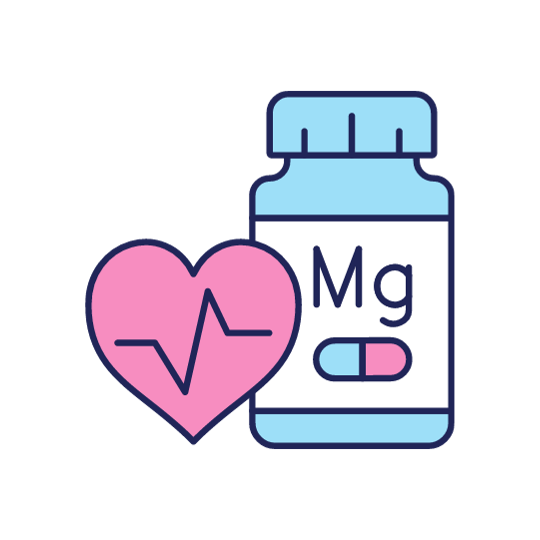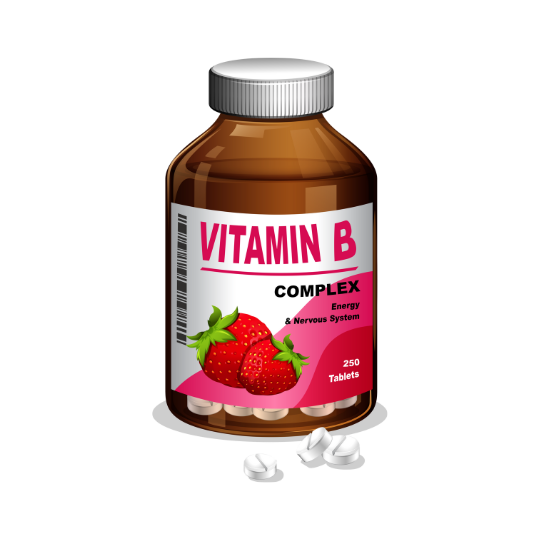Hormonal imbalance can have a significant impact on your mental health and well-being. From menstrual cycle irregularities to mood swings, weight gain, and fertility issues, hormonal imbalances can wreak havoc on your daily life.
In this guide, we will take a deep dive into everything you need to know about hormonal imbalance. We’ll discuss the signs and causes of hormonal imbalances, how diet impacts hormone balance, and whether supplements can help restore harmony. We’ll also examine five key hormone-balancing supplements in detail — magnesium, B vitamins, probiotics, omega-3 fatty acids, and vitamin D3.
Finally, we’ll cover what happens when you start balancing your hormones and how a hormonal imbalance can affect your overall health. Whether you’re experiencing symptoms of hormonal imbalance or just looking to optimize your health, this guide is for you. So let’s get started!

Understanding Hormonal Imbalance
Hormones play a vital role in coordinating different functions within the body.
They act as chemical messengers, carrying important messages through the blood to various organs, muscles, and skin. However, an imbalance in hormones can occur when there is either an excess or deficiency of one or more hormones. This imbalance can have far-reaching effects on various bodily functions and lead to health issues. Statistics show that a staggering 80% of women experience hormonal imbalances.
Achieving and maintaining hormonal balance is essential for overall health and well-being.
Identifying the Signs of Hormonal Imbalance
When it comes to hormonal imbalance, paying attention to your body is crucial. Keep an eye out for symptoms like hot flashes, hair growth, and fatigue, as these can indicate an underlying hormonal issue.
Mood swings, weight gain, and low energy levels are also red flags.
Irregular periods and fertility issues may be linked to hormonal imbalance as well.
The Causes behind Hormonal Imbalances
Hormonal imbalances can be triggered by various factors, such as chronic stress, poor diet, and lack of exercise. Additionally, certain health conditions like PCOS and thyroid disorders can contribute to hormonal imbalances. Environmental factors, including exposure to toxins, can disrupt hormone production as well.
It’s important to note that hormonal imbalances can occur at different stages of life, such as during puberty, pregnancy, and menopause. By identifying the root causes of hormonal imbalances, individuals can effectively address and manage them.

Role of Diet in Hormone Balance
A well-balanced diet plays a crucial role in maintaining hormone balance. Nourishing your body with nutrient-rich foods supports the production and regulation of hormones.
To promote hormonal health, include foods that are rich in omega-3 fatty acids, B vitamins, and vitamin D. These nutrients have been linked to the promotion of hormonal balance.
On the other hand, it is important to avoid processed foods and excessive sugar intake as these can contribute to hormonal imbalances. Additionally, having a healthy gut microbiome is essential for hormone balance, so make sure to include probiotic-rich foods in your diet.
Do Supplements Really Help in Balancing Hormones?
Supplements can support hormonal health and complement a healthy lifestyle. They provide additional nutrients that may be lacking in the diet.
Certain herbs and vitamins have shown positive effects on hormone balance.
It’s important to take supplements under medical supervision for safety and effectiveness. Keep in mind that supplements alone may not fully resolve hormonal imbalances.
The Science Behind Hormone Balancing Supplements
Hormone-balancing supplements contain ingredients that support hormone production and regulation. Herbal supplements like chaste tree, withania somnifera, and black cohosh have been used for centuries to balance hormones. Certain vitamins and minerals play a vital role in hormone synthesis and function.
Clinical studies have shown the potential benefits of specific supplements in improving hormonal balance. Consult with a healthcare provider before starting any hormone-balancing supplements. These supplements can complement a healthy lifestyle and provide additional nutrients that may be lacking in the diet. By understanding the science behind hormone balancing supplements, you can make informed choices to support your hormonal health.
5 Best Supplements to Balance Hormones
1- Magnesium

Magnesium plays a vital role in hormone production and function, aiding in the conversion of vitamin D into its active form. It helps regulate insulin, cortisol progesterone, and estrogen levels. It also maintains thyroid hormone balance.
When there is a deficiency of magnesium, hormonal imbalances may occur, leading to related symptoms. By supplementing with magnesium, you can improve menstrual health and reduce the symptoms of PMS. The recommended daily allowance for magnesium is 320mgs per day.
Adequate magnesium levels are crucial for overall hormonal balance and optimal health. Remember to consult with a healthcare provider to determine the appropriate dosage of magnesium supplements for you.
2 – B Vitamins

B vitamins, including B12, B6, B5, and B3, are crucial for hormone synthesis and regulation. while vitamin B12 specifically supports healthy hormone production. Vitamin B6 plays a crucial role in balancing estrogen and progesterone levels, and vitamin B3 aids in the synthesis of sex hormones. These vitamins also play a role in the production of serotonin, a neurotransmitter that affects mood and overall well-being. B vitamin supplements also help the body to lower stress levels, stabilize metabolism, and reduce weight instabilities associated with changing hormone levels, in addition to encouraging the production of the “feel good” hormone, serotonin.
Additionally, B vitamins support the function of the adrenal glands, which play a significant role in hormone production. A deficiency in B vitamins can disrupt hormonal balance, making supplementation beneficial.
By ensuring adequate intake of these vitamins, individuals can support their body’s hormone production and maintain a healthy balance. It is important to consult with a healthcare provider to determine the appropriate dosage for B vitamin supplementation.
3 – Probiotics

Probiotics play a key role in improving gut health, which is closely linked to hormone regulation.
Certain strains of probiotics have been found to reduce hormonal imbalances, supporting a more balanced hormonal environment. Additionally, probiotics support a healthy immune system, indirectly influencing hormone function. Research suggests that probiotics may be beneficial for alleviating symptoms of polycystic ovary syndrome (PCOS).
By adding probiotics to your diet, you can contribute to a more balanced hormonal environment. Incorporating these supplements into your routine can have a positive impact on your overall hormone health.
4 – Omega-3 Fatty Acids
Omega-3 fatty acids are crucial for hormone production and regulation, making them an important supplement for balancing hormones.
These essential fats are necessary for the production of hormones like estrogen and progesterone. They help regulate the menstrual cycle, reducing menstrual pain and supporting overall reproductive health. Omega-3s also have a positive impact on brain health, which is important for hormone regulation. Research suggests that omega-3 fatty acids may even reduce the risk of hormone-related conditions such as polycystic ovary syndrome (PCOS). These essential fats have been found to reduce inflammation, which is often associated with hormonal imbalances.
By supporting overall hormonal health and function, incorporating omega-3 supplements or foods rich in omega-3s can contribute to a more balanced hormonal environment. So, don’t forget to include this powerful supplement in your hormone-balancing journey.
5 – Vitamin D3
Vitamin D3, an essential nutrient, plays a significant role in maintaining hormone balance. Adequate levels of vitamin D3 are crucial for the proper functioning of the endocrine system.
It has been found that maintaining sufficient vitamin D3 levels is associated with improved energy levels and mood. Moreover, research suggests that vitamin D deficiency can lead to menstrual irregularities and imbalances in estrogen levels. Additionally, vitamin D3 supports bone health, which is influenced by hormone balance. It also helps support the health of the thyroid gland, which is vital for hormone regulation.
Including vitamin D3 supplements or getting enough sun exposure can contribute to hormone balance. Vitamin D3 is an important component in achieving and maintaining overall hormonal health.
Choosing the Right Hormone Balance Supplement for You
When selecting a hormone balancing supplement, there are several factors to consider.
First, evaluate the ingredients to ensure they align with your specific hormone balance needs. Look for key vitamins and minerals that play a crucial role in hormone regulation.
Consider your personal preferences, such as capsule vs. liquid form or vegetarian options.
Additionally, reading customer reviews and considering the reputation of the supplement brand can help you make an informed decision.
It’s also important to take into account any potential interactions with other medications or supplements you may be taking. For personalized guidance, consult with a healthcare professional who can recommend the best hormone balancing supplement for you.
What happens when you start balancing your hormones?
When you start balancing your hormones, you can experience improved energy levels and overall well-being.
It may alleviate symptoms like mood swings and irregular periods.
Hormonal balance supports healthy weight management and reduces the risk of certain health issues. It promotes optimal bodily function, mental clarity, and emotional health.
How does a Hormonal Imbalance affect your overall health?
A hormonal imbalance can have significant effects on your overall health.
It can lead to weight gain, mood swings, and disrupt the menstrual cycle. Hormonal imbalance may also contribute to the development of chronic health issues and insulin resistance.
Maintaining hormonal balance is crucial for optimal physical and mental well-being.
FAQs
Are hormones proteins?
Hormones have the ability to exist as either proteins or steroids, although the majority of hormones are in fact proteins. In the case of humans, it is only the sex hormones and hormones originating from the cortex of the adrenal glands that are classified as steroids.
Do hormones regulate metabolism?
Certain hormones are essential for the metabolic process. These hormones comprise insulin, glucagon, and thyroid hormones. Additionally, sex hormones such as estrogen, progesterone, and testosterone play a significant role in regulating your metabolism.
What causes a hormone imbalance?
A hormone imbalance can be caused by various factors, such as physical or mental stress, specific medications, cancer, and trauma. Additionally, hormone imbalances may also arise during significant life stages like puberty and menopause.
What are signs of a hormone imbalance?
If there is an imbalance in your hormones, you may encounter symptoms such as tiredness, nervousness, moodiness, sleeplessness, and issues with sexual function. Other potential symptoms include acne, fluctuations in weight, and difficulty conceiving. If you are currently experiencing any of these symptoms or other indications of a hormone imbalance, it is recommended that you consult with a healthcare professional.
Conclusion
In conclusion, finding the right supplements to balance your hormones can greatly improve your overall health and well-being. Whether it’s magnesium, B vitamins, probiotics, omega-3 fatty acids, or vitamin D3, each supplement plays a crucial role in maintaining optimal hormone levels.
However, it’s important to remember that supplements alone may not be enough. A healthy diet, regular exercise, and stress management are also key factors in achieving hormonal balance. Always consult with a healthcare professional before starting any new supplement regimen. Take control of your hormonal health and experience the positive changes that come with balanced hormones.




